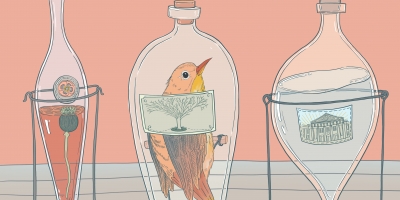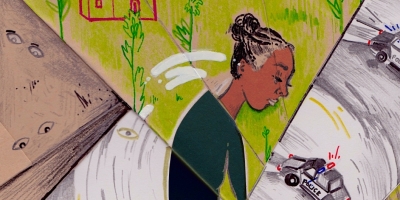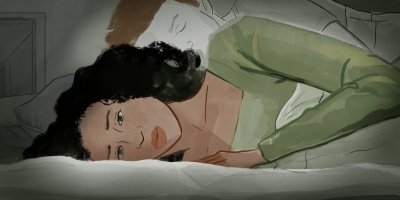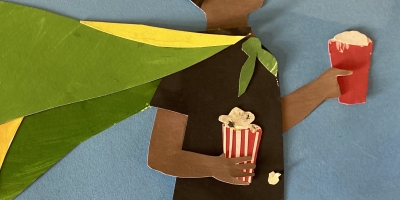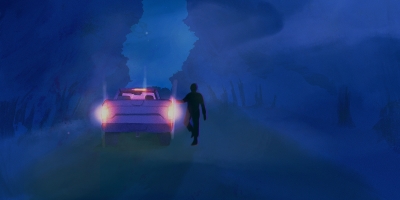Nonfiction
A History of Suspicion
by Ashaki M. Jackson

The realtor continues to show you and Mom small homes in less desirable parts of town. You need more than just an esteemed job to move your wife and child into the Central Valley’s hot mouth; you need space to root yet these lots aren’t comparable to what we’re leaving behind. You firmly tell the realtor “no” to the last house on her list. Stumped, she mentions that there is a home for sale farther east of the university, big houses and big parcels where the city returns to its chicken farm beginnings. You purchase a country-adjacent home for us directly from the owner—a good, stout, German family man—because it is easier, cleaner. Hand-to-hand, you avoid any housing covenant preventing us from living there, which had for so long kept suburbs impenetrable.
We haven’t lived in the neighborhood long enough to fill our new home’s empty spaces when the neighbors turn their collective attention to us. One moves away almost immediately. Another rushes out of her home to ask you if you are stealing a car. We thicken the silence in an already-quiet neighborhood. On the day you take stock of the oddly-placed boulders beneath our trees in the front yard, a patrol accelerates toward the dead end that our home shares with another. From his window, he shouts, “Where are you going?” Tells you to stop walking back inside and shouts again, “Where is your partner?” He suspects that you, holding our mail, and an unseen partner are casually burgling our home.
Maybe you, raised on the Black side of southern towns, hear the Hey, Boy in his voice. You hear what I sometimes cannot. His cruiser is still running as he pursues you on foot. All of him is in a hurry, which doesn’t match this slow-growth city. You respond to his question by walking him into our home. I hear nothing until the second time you shout for me and Mom. Your call is urgent, deeper. We rush to meet you at the bend of our L-shaped house—the front entryway among our Black American artifacts. “Yes, Daddy?” You and I face each other. The officer is behind you with a hand on his holster. “Is this one of your students?” I ask you while looking at him. “Hello.” I hold eye contact with the officer because I have manners. You look at me intently and do not speak. The officer continues to comfort his holster, and I watch him, waiting for him to respond to anything. The house is muffled in its suburban silence for a good ten seconds. You turn toward the officer and parade him to his car that is still growling low and loyally waiting at the yellow dead-end barrier. “He is not my student,” you reply when you return, after you lock the front door.
Weeks later, you find out from a department colleague who also lives in our neighborhood that we do not have a patrol.
In the new America, I want to be unseen, meaning to live as a Black person in the United States without being surveilled, studied, assumed suspicious. Freely. I’m asking, with doubt at my throat, to uproot laws against us that are older than Democracy, fully understanding that this is not a country that revises outdated rules; rather, this nation keeps them as precedent and reference. Surveillance of Black people is one of those darlings—a tradition of deputizing sight against us and casually revoking citizenship by simply seeing us as foreign and undeserving of America’s promises.
Before floodlights surrounded housing projects to reduce crime through endless, antagonistic illumination, police officers lingered to ensure our safety and check our identification. Prior to police sentry, it was an off-the-books rule preventing us from making eye-contact with white people for fear of them feeling judged or sexualized. Even further back there were community watches and Lantern Laws; walking at dusk without a lantern to reveal our faces or without a white companion to usher us to and from the plantation was cause for punishment. Illumination has always been complicit in our harm; to be seen at all times of day is to be a target of suspicion. This profiling—an attempt to maintain physical and social security by keeping Black people at a distance—has always been one-directional, as in traditionalist white Americans are watching you so that they remain safe, and that comfort, in turn, allows for Black survival.
This long practice of looking at and interpreting people through a lens that centers whiteness as a behavioral and aesthetic template, referred to as white gaze, damages how Black people understand ourselves in this nation. Being defined by onlookers’ racist expectations and scrutinized to the bone doesn’t convey to us that we are free to live life abundantly. Instead, it has created objects and symbols of us; we are categorized as what America is not, creating discomfort in our being part of this nation and in our skins.
When I answer our phone, the caller is always a man pretending to be your student. A proper-speaking voice, plain and not necessarily uncordial. I pass the phone to you. You say hello, then hang up in three seconds. This only happens twice before you tell me and Mom not to answer the phone anymore. Someone is watching us. Instead of answering the phone, we let calls go to the machine. We have turned the volume up so that we can hear any caller begin to leave a message. We all pause when the machine beeps and we listen and decide if the person speaking is safe. I run to the phone when my aunt says hello three times or Grandma calls your name. Often, there is no caller or we hear a caller hang up. The calls continue for longer than a year.
I am a high school freshman with a police detail. Mom also has a detail at her job just a couple miles west. The sergeant believes this is the right course of action because the night caller claims to know my class schedule and where my mother works. Now the suspect is a student, a parent, or any adult employee on our campuses—someone holding the belief that we do not deserve peace. I do not know what school administrators know of my family’s situation; I’ve likely been shielded and know much less than they do. I worry that the officer who came into our home brimming with umbrage is on our detail but not on our side.
You teach me how to be cautious. You teach me that there is a difference between being looked at and being watched.
Now and always, we are both.
I enter adulthood with little expectation or genuine experience of privacy outside of my home. Not yet knowing who is behind the threats against us, I carry a healthy suspicion of people into my predominantly white college and most public spaces. I smile and mind my business. I am polite enough. I sit with my back to walls like you teach me. I lock my doors immediately upon entering my car and apartment. And, I let all unknown phone numbers go to voicemail first. I do what is in my capacity to not be so seen in the world.
This is not a sustainable way to live.
Being stalked because white gaze deems my family undeserving—a threat to normalcy—and being watched tactically by officers who might also question the value of Black life erodes my sense of safety. On some level, I believe this is how white gaze is supposed to work. To continually look at a Black person is to consider their strangeness, to perform how out of place they are, and to openly question their belonging.
There was a moment of stillness when the world closed in March 2020—when the public was first in confinement and disoriented by fear. Los Angeles skies were smog-less. Birds all spoke at once. Like a homeroom class, the nation moved through medical and history lessons together, loyal to the news on our screens. We learned that the virus swallowing all hemispheres infects the respiratory tract, and we tweeted exhaustively on Watchmen’s reenactment of the race riot that decimated Tulsa’s Black Wall Street. We learned that the virus could manifest differently across demographic profiles, and we celebrated Juneteenth. We witnessed people rally against their health to get haircuts, and we watched a police officer leisurely kill a man. Protestors across six continents swarmed streets enraged at the ritual of police killing Black people with impunity. It was apparent in social media discourse that Black Americans understand the nation’s history to be a series of violent, oppressive events beginning with slavery that evolved into the health disparities and marches, yet white Americans do not hold these memories. It was only obvious to part of America and its international audience that we were experiencing another slavery fallout, that we dragged the plantation and its machinations into the present.
Among the ways I measure how far we’ve come from the plantation is a count of how many laws meant to restrict enslaved Black people are still in play.
I’ve always thought this to be a more honest way of seeing our growth as a nation toward Black freedom, survival, and prosperity than relying on the number of affluent Black people or the number of Black people in positions of power. That Black millionaires and Stop-and-Frisk existed at the same time means that our inclusion in capitalism is not the path toward living freely in this nation. Lingering practices like community surveillance and requiring Black people to produce identification at-will are reminders that the plantation remains at our heels. White gaze, whether or not the observer is white, still anticipates Black people to be suspicious, undeserving, menacing, unscrupulous, uneducated, or on the brink of violence. Fearful imagination of who we are, seeded into the American psyche over centuries, has created a vigilant public that watches Black behavior and Black movement for no benefit beyond a sense of civic, patriotic duty.
It was a civic duty, perhaps, for a store manager in Philadelphia to have two Black men forcibly removed from Starbucks, the nation’s second living room, for sitting, waiting for a business partner. The manager didn’t like the looks of them. White patrons doing the very things the men were accused of—loitering and using restroom facilities without having purchased anything from the café—watched. In New York, volunteers from as far as Queens have taken turns sitting outside a Long Island nurse’s home during the pandemic to prevent a third year of terror by her neighbors. In her neighbors’ dutiful efforts to put the nurse in her place (i.e., repeatedly communicating that she was unwelcome), they shot pellets at her home, burned her home, spat in her yard, placed dead squirrels and feces in her yard, and verbally threatened her life. A long, vertical, handwritten account posted on her front door reads, “I live in fear for my life at home.” Police could not act because she was not physically harmed, so they watched. Police in a different state were exact, however, in shooting an Ohio Walmart shopper who was holding an air pellet rifle that he picked up in the sporting goods section. The customer who called 911 was unironically concerned that the shopper was holding a store rifle in an open-carry state. The threat was neither the gun nor the Second Amendment. These are the incidents that uproot Black people and churn our sense of belonging, our very presence is an agitator that draws violence.
Consider the erosion of how we see ourselves if we have, all our lifetimes, received endless commentary on who we are from mouths that do not belong to us. We have long been considered representations of danger and loss of empire. Because we can no longer be monitored systematically on the plantation, surveilling has become the primary surrogate that riles us out of our comfort.
In the new America, I don’t want us twist and tuck ourselves to demonstrate that we are worthy of living in the same spaces by the same laws. We haven’t earned many rewards for shapeshifting, softening into less intimidating versions of ourselves to assimilate—being only moderately blackish during work hours, with exuberant enunciation and tamed hair, trying to claim space in a country never designed with Black citizens in mind. I want us to exist beyond who we are imagined to be and outside of everyday labor of Black living. I want space for us to answer Who am I/Who are we without the gaze. In what ways are we tender, and who receives this version of us? What can our hands build, and what can they hold? I have experienced our capacity of softness, curiosity, fairness, and fullness. I want us to know the other side of surveillance and for us to become our own beloved.
My landlord quietly installs cameras around the complex once white tenants begin to move in. A camera on each corner of the building—gentrification ears that perk up when anything moves. Two cameras point toward our residential street. Two to the north, two to the south. Two others point at the parking lot behind the building. They are conspicuous; tenants notice them immediately when approaching home. The family next door—residents for thirty years, four children, and two grandchildren—asks me if the cameras are angled at them and who is watching. The neighborhood is two decades past its troubled history. A mass sweep of gang members put most away for long sentences. The few OGs who return to the neighborhood post-release are disoriented by its new face and mine. They never stay long enough to see that the neighborhood still holds sweetness. Jacaranda blooms and pick-up trucks crowd the sidewalks during early summers. Oldies seep out of detailed cars on Sunday mornings. The elote man is persistent with his squeeze ball horn every afternoon. We all say hello, and we check on each other regularly even if from between our window blinds. Here, I am seen but not watched.
I email my landlord the day after a new, lonely surveillance camera appears at my door. Arriving home last night to a face-level camera at my stoop immediately reminded me that I’d like to opt-out of surveillance on the property. The half-dome is angled at every visitor to my doorstep and somewhat at the mailboxes at the bottom of my five stairs. My family has a history of being surveilled. It’s uncomfortable. Will you please consider removing or relocating that camera? The cameras hadn’t been there for eight years of Black, Brown, and Asian families; every bit of lighthearted chisme we shared was from sight and memory.
Dear A — Cameras are just one part of the effort to improve safety/security — I think you might be aware we are also working on other projects by partnering w/ the LAPD in community policing and starting up a local neighborhood watch.
My childhood memories return in full color, and the fearful imagination has returned. The complex’s cameras remain for the new tenants and point at the rest of us. Surveillance cameras now adorn light posts throughout the neighborhood and echo that we fit the description, despite facial recognition software misidentifying Black people’s faces five to ten times more often than those of white people. We are, in our communities, made to be strangers.
I offer that the alternative to white gaze’s fearful imagination is not for the public to sympathetically see us as individuals equally deserving autonomous, fulfilling lives. The alternative is for Black people to live within the rubrics of our individual and collective making, to find wholeness in what we create for ourselves, to exist without being pathologized and without penalty. I see us rushing toward ourselves in a collective pivot from the now. In the next iteration of America, I want to see us collectively repair how we have learned to see ourselves. Strangers in our own reflections, I want the chance to gather, grow, and claim all that we are discreetly, in love.
We deserve reprieve.
Very recently, I ask you to help me remember the incidents again. You tell me there are more stories, but I want to focus on childhood in that small California city. I think it is the richest set of experiences that shaped how I move through the world. Your mental index of being surveilled and even hunted by supremacists reaches back to high school in a humid Louisiana township. For both of us, living in others’ sight shaped how we exist and complicated our interactions with people and spaces.
You tell me that the year prior to our arrival, area Klan members decided to march on Martin Luther King, Jr. Day. A colleague shared this with you and Mom for transparency during your first visits to the area, yet you decided we would still come because opportunity outweighs oppression. You also tell me that our case was never resolved. The police department exhausted dedicated resources on our detail. The sergeant, an ally, encouraged you to arm yourself. You say that three parties stalked us. You do not know if they were aware of each other, or if the harassment was coordinated. There were upsetting call patterns once Federal agents wiretapped our phones. Calls stopped when the wiretap was activated and resumed when the wiretap was deactivated. You also reveal that the sergeant visited our neighborhood in the evening, on a hunch, to scan nearby homes. Because calls to the house began when you returned from work in the evening, she proposed that someone must be waiting for you to arrive. A classmate’s home was the only other lit house when she patrols. I reach several epiphanies during my call with you about my safety then and now.
I tell you how grateful I am for holding this weight and protecting me from more extensive trauma than my everyday mistrust I’ve since developed. I ask if you or Mom ever spoke to someone like a therapist during the stalking to ground you, to process, to restore your sense of security. You respond, “Each other,” and laugh.
